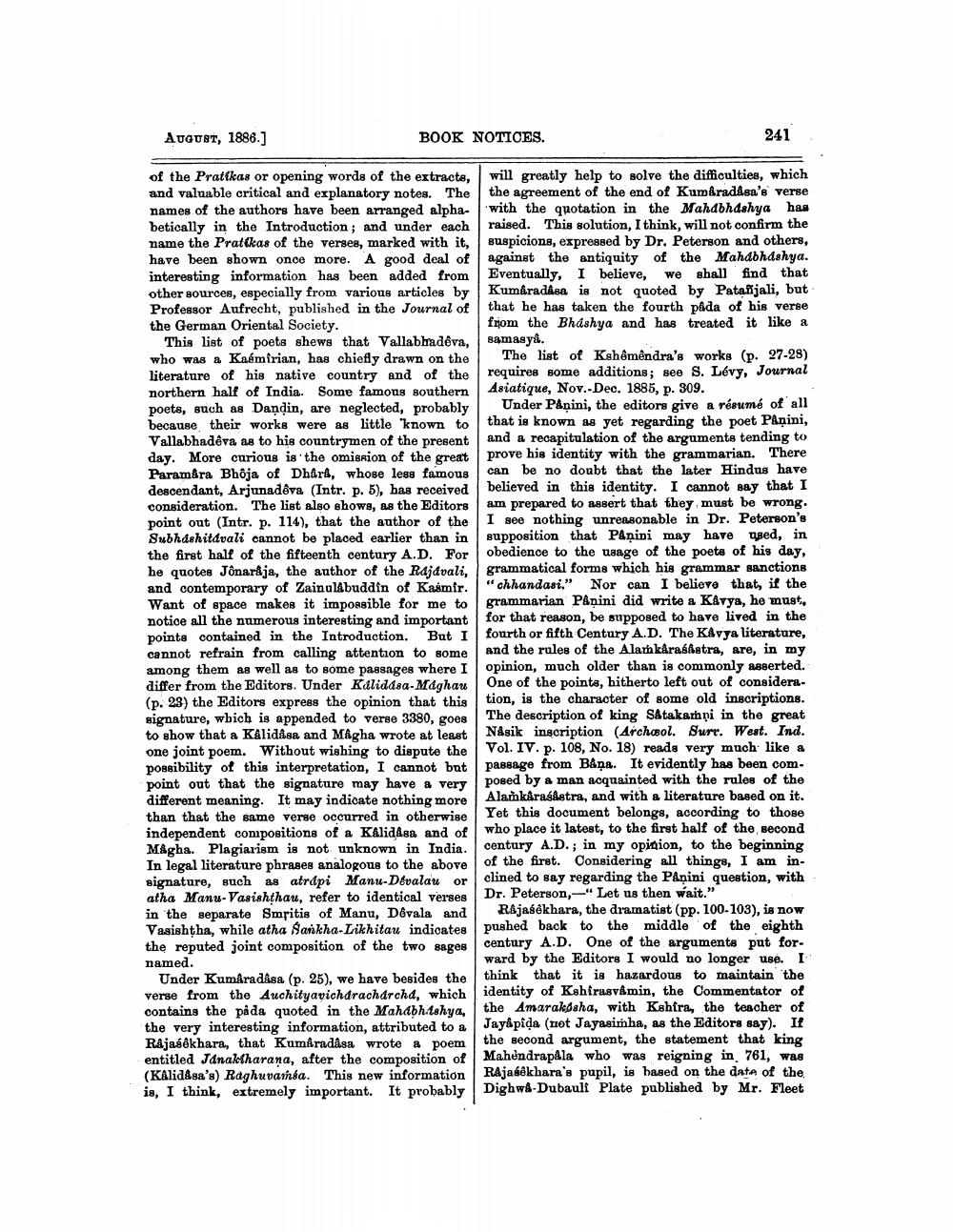________________
AUGUST, 1886.)
BOOK NOTICES.
241
of the Pratikas or opening words of the extracts, will greatly help to solve the difficulties, which and valuable critical and explanatory notes. The the agreement of the end of Kumaradasa's verse names of the authors have been arranged alpha- with the quotation in the Mahabhdshya has betically in the Introduction; and under each raised. This solution, I think, will not confirm the name the Pratikas of the verses, marked with it, suspicions, expressed by Dr. Peterson and others, have been shown once more. A good deal of against the antiquity of the Mahabhdshya. interesting information has been added from Eventually, I believe, we shall find that other sources, especially from various articles by Kumfradása is not quoted by Pataljali, but Professor Aufrecht, published in the Journal of that he has taken the fourth pada of his verse the German Oriental Society.
from the Bhashya and has treated it like a This list of poets shews that Vallabhadeva, samasyå. who was a Kasmirian, has chiefly drawn on the
The list of Kshêmêndra's works (p. 27-28) literature of his native country and of the
requires some additions; see S. Lévy, Journal northern half of India. Some famous southern
Asiatique, Nov.-Dec. 1885, p. 309. poets, such as Dandin, are neglected, probably Under Påņini, the editors give a résumé of all because their works were as little 'known to that is known as yet regarding the poet Paņini, Vallabhadeva as to his countrymen of the present and a recapitulation of the argumente tending to day. More curious is the omission of the great prove his identity with the grammaria Paramara Bhôja of Dhara, whose less famous can be no doubt that the later Hindus have descendant, Arjunadôva (Intr. p. 5), has received believed in this identity. I cannot say that I consideration. The list also shows, as the Editors am prepared to assert that they must be wrong.
pint out (Intr. p. 114), that the author of the I see nothing unreasonable in Dr. Peterson's Subhdshitdvali cannot be placed earlier than in supposition that Panini may have ved, in the first half of the fifteenth century A.D. For obedience to the usage of the poets of his day, he quotes Jônaråja, the author of the Rajavali,
grammatical forms which his grammar sanctions and contemporary of Zainulkbuddin of Kasmir.
"chhandasi." Nor can I believe that, if the Want of space makes it impossible for me to grammarian Pånini did write a Kavya, he must.. notice all the numerous interesting and important for that reason, be supposed to have lived in the points contained in the Introduction. But I fourth or fifth Century A.D. The Kavya literature, cannot refrain from calling attention to come and the rules of the Alankarasastra, are, in my among them as well as to some passages where I opinion, much older than is commonly asserted. differ from the Editors. Under Kaliddsa-Maghau One of the points, hitherto left out of considera(p. 23) the Editors express the opinion that this tion, is the character of some old inscriptions. signature, which is appended to verse 3380, goes The description of king Satakarni in the great to show that a Kalidasa and Magha wrote at least Násik inscription (Archosol. Sure. West. Ind. one joint poem. Without wishing to dispute the Vol. IV. p. 108, No. 18) reads very much like a possibility of this interpretation, I cannot but passage from B&ņa. It evidently has been compoint out that the signature may have a very posed by a man acquainted with the rules of the different meaning. It may indicate nothing more
Alakaraśkstra, and with a literature based on it. than that the same verse occurred in otherwise Yet this document belongs, according to those independent compositions of a Kálidasa and of who place it latest, to the first half of the second Macha. Plagiarism is not unknown in India. century A.D.; in my opinion, to the beginning In legal literature phrases analogous to the above of the first. Considering all things, I am insignature, such as atrdpi Mann-Devalar or clined to say regarding the Panini question, with atha Manu-Vasishthau, refer to identical verses
Dr. Peterson,-"Let us then wait." in the separate Smsitis of Manu, Dévala and
R&jaśêkhara, the dramatist (pp. 100-103), is now Vasishtha, while atha Sankha-Likhitau indicates
pushed back to the middle of the eighth the reputed joint composition of the two sages century A.D. One of the arguments put for. named.
ward by the Editors I would no longer use. I Under Kumaradása (p. 25), we have besides the think that it is hazardous to maintain the verse from the Auchityavichdrachdrchd, which identity of Kshfrasvåmin, the Commentator of contains the påda quoted in the Mahabhtshya, the Amaraksaha, with Kshira, the teacher of the very interesting information, attributed to a
Jay&pida (not Jayasimha, as the Editors say). If Rajabokhara, that Kumaradasa wrote a poem the second argument, the statement that king entitled Janakharana, after the composition of Mahendrapala who was reigning in 761, was (KAlidasa's) Raghuvansa. This new information Rajasekhara's pupil, is based on the data of the is, I think, extremely important. It probably Dighwa-Dubault Plate published by Mr. Fleet




